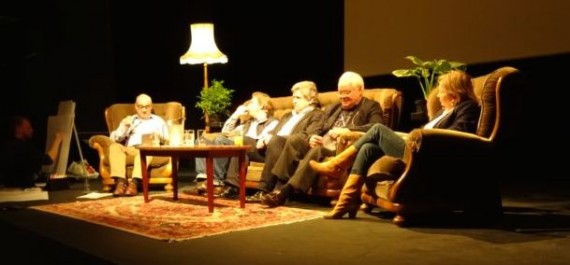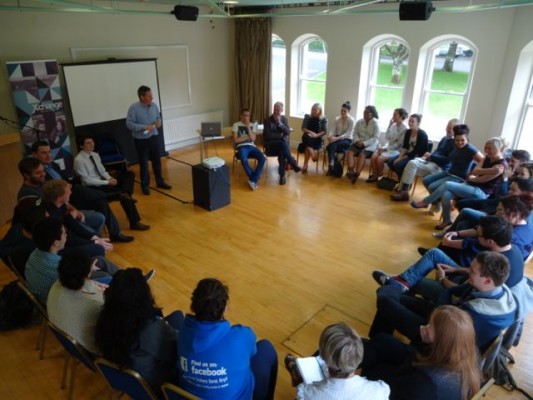It turns out that it doesn’t always rain in Enniskillen! From Thursday to Saturday, Xchange’s inaugural summer school enjoyed balmy weather in and around the Ardhowen theatre as delegates chatted, ate, drank, debated and challenged each other’s views on the arts, the media, liberties and history.
Chaired by Denzil McDaniel, the opening session asked whether we could change the conversation about the arts.
Actor Adrian Dunbar welcomed the delegates to his own town.
The theatre is everybody’s home. It’s not claimed space. It’s our space. It’s a place we come to be entertained … It’s the place where we can have these discussion without any baggage coming in on top of us anywhere …
“Why are the arts important?” seems to me like quite a redundant question if we’re still asking that. If we actually ask ourselves if anybody wants to remember that we are here, at all, then we’ll have to address ourselves to the arts. All that we know of Greece. All that we know of Rome. All that we know of Egypt. We’ve only kept the beautiful stuff. All the ugly stuff we get rid of.
What’s going to be left of us? That’s the question I ask you. In three hundred years time? Some of Friel’s plays? Some of Heaney’s poetry? Some of Basil Blackshaw’s paintings? William Scott yes. Those are the things that will be left of us. So it’s really incumbent on us to look at the arts in this very, very precious and particular way and realise that it’s central to us and our aspirations.
Dan Gordon spoke next.
spoke next.
We, us, this place, where we live we have attracted the attentions of the world, because we’re brilliant, and we’re bloody. That attention has given us global aspirations because we’ve been parading – that’s probably a bad metaphor! – performing might be better, competing I think is best. We’ve been competing on a world stage and unfortunately more often than not we do so from a provincial perspective and we filter practically everything through a lens of national, provincial and parochial history. That’s what holds us back.
Like a game of playground football, Dan argued that locally, we lack imagination, missing the bigger picture and just seeing the incidents in the game. Dan recalled advice from his father, a shipyard worker:
Don’t stand and wonder how to do it. Do it, and wonder how you did it.
Climbing Everest was an ambition of Dan Gordon. But pay enough money and he reckoned the Sherpas will push you up to the summit. So instead, he looks for other less-crowded Everests.
“Community arts” is a misnomer. Arts are for everybody. We’re all the community. Segregating, renaming them, diluting them? It’s counter-productive. We can’t have a full orchestra and a ballet company in your local school. But what we can do is have outreach, a few players and a couple of dancers. We don’t build hospitals on every street corner despite what [Stephen] Nolan would like. It’s not practical. Making people stay in their homes to receive care has limited practability. People want to travel to a hospital where they believe they get the best practice and facilities and care. Yet they’re very happy to insist that artists should be entertaining us on our doorsteps …
Arts can create social change in a most positive way, but creating art solely for the purpose of change has a whiff of national socialism about it that makes me a little bit more than uncomfortable.
Pauline Ross founded the Playhouse Theatre in Derry with £300 in 1992 which recently won an award for its “community impact”.
… in this [Ardhowen] theatre it’s the pantomime run that subsidises the opera, so it’s the pennies of the working class and the poor that’s providing the luxuries for the middle classes.
Theatre can bear witness to the most horrible things, the most beautiful things. It can make horrible things digestible. You can speak the unspeakable through theatre. And you can create the empathic moral imagination that John Paul Lederach – one of the world’s greatest peacemakers – talks about. It’s boundless …
Like yeast is to bread, the arts are to us in our humanity. They lift us up, and they make us realise we’re are better than we think we are ourselves.
Ian Hunter, originally from Sian Mills, spent time working in New Zealand and now runs an arts charity in Manchester. He began by describing his tricky pilgrimage to find Seamus Heaney’s grave. Art could transform the ordinary into the universal. He questioned who creates policy? He talked through an example of how National Lottery money had been leveraged to finance an art projects, and highlighted how the work of trade unions could be celebrated and showcased.
 Earlier on Thursday morning a group of young people – teens and twenties – had gathered in the Ardhowen Theatre to discuss and debate the four issues of arts, media, liberties and history. Around the arts, they pointed to the usefulness and need for networks and connections to access equipment to further their creativity. A local low-cost ephemeral art and activism project had been derailed when they asked permission to chalk peace quotes onto local pavements – there was no distinction between good and bad graffiti.
Earlier on Thursday morning a group of young people – teens and twenties – had gathered in the Ardhowen Theatre to discuss and debate the four issues of arts, media, liberties and history. Around the arts, they pointed to the usefulness and need for networks and connections to access equipment to further their creativity. A local low-cost ephemeral art and activism project had been derailed when they asked permission to chalk peace quotes onto local pavements – there was no distinction between good and bad graffiti.
The summer school was always going to be finding its feet with the format and style of the first conversation on the first night of the first year of running. While the ideas weren’t earth-shattering, it’s really up to delegates to decide whether the conversation about the arts changed how they perceive or value artistic endeavour and whether it changed how they will engage with, support or perform the arts. But conversation about the arts definitely continued into the opening night party and could be heard over breakfast the next morning.
Later on in the Q&A that followed the opening speeches it was suggested that there was no use arts organisations complaining about long funding applications and dealing with reams of paperwork associated with grants given how badly money had been treated by them in years gone by. Adrian shared a utopian image of visiting a room full of civil servants all waiting to help him fill out such forms! The audience laughed at Dan Gordon’s suggestion that every time someone rang the Nolan Show, two civil servants were created!
I’ll close with my own lasting reflections from the two hour session:
Artists and artistic organisations should not be ashamed of being skilled, professional or world class. Being at the top of your game isn’t a problem. However, the arts sector must voluntarily account for their efforts – publicly list them – to intentionally find ways to sharing their art with all communities and bring communities into their venues.
While those connected with The MAC have defended Martin Lynch’s recent comments to the Culture, Arts & Leisure Committee, they could go even further. I’m not picking on the MAC … something similar could be imagined for thirty or forty venues across Northern Ireland. Indeed, Martin’s criticism – misplaced or not – should spur organisations on to redouble their efforts to both explain their current outreach work and audience development work, as well as find new ways to open doors to let the art out and diverse audiences in.
So while I’m aware that The MAC provide free transport for schools to bring (paying) groups of children to their shows, perhaps that transport needs to be extended to invite nurseries and mother and toddler groups to bring them into The MAC’s family room full of children’s literature. That way, more diverse audiences might then turn up for the free monthly Storytime Sunday that runs at noon on the first Sunday of the month, and drive attendance at other events.
I’m told that Lisburn’s Island Arts Centre no longer has a café. Despite being on the River Lagan, with walkers passing by, the programming in the venue and visitor numbers have likely resulted in catering not being commercially viable. While there is a great children’s programme over the summer, it is disappointing that the programme throughout the year does not regularly bring enough individuals or groups into the facility during the day to sustain a café. (The café franchise in the nearby Lisburn Library is also vacant.) The Island Arts Centre may not be terribly elitist, but it might want to target itself in getting a higher proportion of ratepayers through its doors each year.
Other delegates at the Xchange summer school should feel free to add their tuppence-worth in the comments below about their any ways in which discourse about the arts was changed for them.
Alan Meban. Tweets as @alaninbelfast. Blogs about cinema and theatre over at Alan in Belfast. A freelancer who writes about, reports from, live-tweets and live-streams civic, academic and political events and conferences. He delivers social media training/coaching; produces podcasts and radio programmes; is a FactCheckNI director; a member of Ofcom’s Advisory Committee for Northern Ireland; and a member of the Corrymeela Community.
Discover more from Slugger O'Toole
Subscribe to get the latest posts to your email.
